
Counselors are often concerned about a child’s emotional literacy. Emotionally literate children can manage their feelings and their reactions to those feelings. They can recognize and respond to other people’s feelings, which is a significant advantage in life. Many of our clients are not emotionally literate and our work with those children includes developing and enhancing the child’s ability to identify and express their feelings. Feelings are the most basic building blocks of social skills. Without the ability to recognize feelings in themselves and others, children are not able to master social interactions. Children adept at identifying and expressing their feelings are likely to display increased empathy which is crucial for social competence, social relatedness, and pro-social behavior. Children with deficits or even difficulties in their ability to identify and express their feelings may display excessive anger and frustration, and have more troubled interpersonal relationships with peers, teachers, and family members.
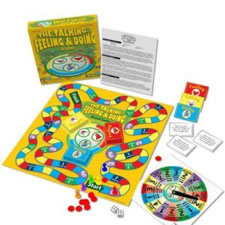 Since the development of The Talking, Feeling, and Doing board game in the 70’s, there have been hundreds of games developed to promote feeling identification and expression. Below is a brief survey of six of the most popular games currently on the market.
Since the development of The Talking, Feeling, and Doing board game in the 70’s, there have been hundreds of games developed to promote feeling identification and expression. Below is a brief survey of six of the most popular games currently on the market.
Feeling’s Detective is a matching game and is especially helpful with children who have difficulty picking up on social cues. It is suitable for children in grades 1-6. Feelings
Detective helps children understand their own feelings as well as the feelings of others. It is especially helpful for children who tend to misread social cues, including those who have been diagnosed with Asperger’s Syndrome or are at any other position on the Autism Spectrum. Specific examples help players link specific situations and thoughts with specific feelings.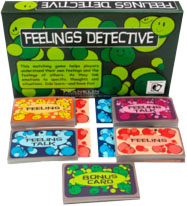
The Emotions Mania Thumball is a great ice breaker for children, families, and groups. Thumballs are a soft, stuffed ball that is safe for indoor use. Game play is simple. Simply throw, roll, pass or catch the thumball. Look under your thumb and react to the feeling word found there. Each panel has a different word. The Emotion Mania Thumball includes words such as happy, sad worried, curious, silly, proud and lonely. It is suitable for children, teens, and adults.
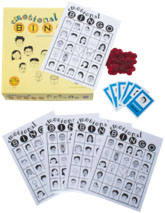 Go Fish: Fishing for Feelings teaches the skills needed to successfully deal with feelings, recognize feelings in others, and identify appropriate feelings. Players practice talking about their feelings in a non-threatening way. Players answer open-ended questions before receiving a requested card. Each question prompts a discussion about successfully dealing with feelings, recognizing other people’s feelings, or identifying appropriate feelings. The game plays like classic Go Fish. There are two decks of 50 cards in each game. One for children ages 5 to 8 years old, and the other for children ages 8 to 11 years old.
Go Fish: Fishing for Feelings teaches the skills needed to successfully deal with feelings, recognize feelings in others, and identify appropriate feelings. Players practice talking about their feelings in a non-threatening way. Players answer open-ended questions before receiving a requested card. Each question prompts a discussion about successfully dealing with feelings, recognizing other people’s feelings, or identifying appropriate feelings. The game plays like classic Go Fish. There are two decks of 50 cards in each game. One for children ages 5 to 8 years old, and the other for children ages 8 to 11 years old.
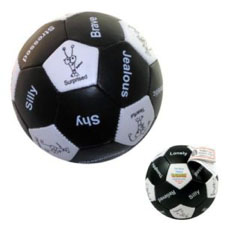 Emotional Bingo for Children (Spanish & English) is a great game for groups, class rooms, and individual sessions. In this bingo game players identify feelings rather than numbers on their Bingo cards. Emotional Bingo helps children learn to recognize various feelings and make empathetic responses. The game rules provide opportunities for children to discuss their own feelings and to respond with empathy to the feelings of others. The children’s version is suitable for children ages 6-12 and there is a version available for Teens.
Emotional Bingo for Children (Spanish & English) is a great game for groups, class rooms, and individual sessions. In this bingo game players identify feelings rather than numbers on their Bingo cards. Emotional Bingo helps children learn to recognize various feelings and make empathetic responses. The game rules provide opportunities for children to discuss their own feelings and to respond with empathy to the feelings of others. The children’s version is suitable for children ages 6-12 and there is a version available for Teens.
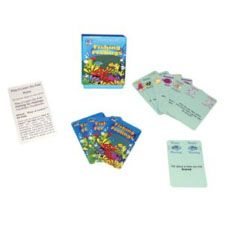 The Yes I Can! Talk About Feelings cards are designed to facilitate conversation, insight, expressive skills, and increase an individual’s feeling word vocabulary. It is suitable for families, classrooms, counselors, & therapists and improves feeling identification and the expression of emotions. The Yes I Can Talk About Feelings game is great for enhancing self-awareness and the impact of one’s behavior. The instructions include several fun activities and suggestions for using the cards. This game is suitable for ages 5 and up, 2-6 players.
The Yes I Can! Talk About Feelings cards are designed to facilitate conversation, insight, expressive skills, and increase an individual’s feeling word vocabulary. It is suitable for families, classrooms, counselors, & therapists and improves feeling identification and the expression of emotions. The Yes I Can Talk About Feelings game is great for enhancing self-awareness and the impact of one’s behavior. The instructions include several fun activities and suggestions for using the cards. This game is suitable for ages 5 and up, 2-6 players.
 BONUS Feelings in a Jar Everyone needs to know how to name and express feelings. Each jar holds 101 little cards printed with “feelings words”—gleeful, insecure, grateful, angry, cranky, courageous, hopeful, and many more. Pull a slip and act out the feeling, or invite someone else to act it out. Use as discussion starters, journaling prompts, or icebreakers for groups. A fun way to encourage dialogue. This is for ages 8 and up. Side note they have others such as MORE Feelings in a Jar and Temper-Tamers Jars.
BONUS Feelings in a Jar Everyone needs to know how to name and express feelings. Each jar holds 101 little cards printed with “feelings words”—gleeful, insecure, grateful, angry, cranky, courageous, hopeful, and many more. Pull a slip and act out the feeling, or invite someone else to act it out. Use as discussion starters, journaling prompts, or icebreakers for groups. A fun way to encourage dialogue. This is for ages 8 and up. Side note they have others such as MORE Feelings in a Jar and Temper-Tamers Jars.
BONUS The UnGame A non-competitive game that encourages conversation and communication. Use as an ice-breaker or for a serious exchange of thoughts, feelings and ideas. This pocket-sized Ungame can be played at parties, in the car, at the beach, at home or anywhere. It is one of six versions and has different questions than the board game. These cards can also be used with the board game. Many different versions but most of them are ages 5 and beyond.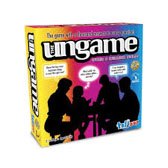
Examples of Pocket Ungame “Families” Version:
Who is the “talker” in your family? Who is the “listener”?
What family holiday experience has left pleasant memories?
What kind of food do you think would describe you? Why?
Describe your mother in three words.

